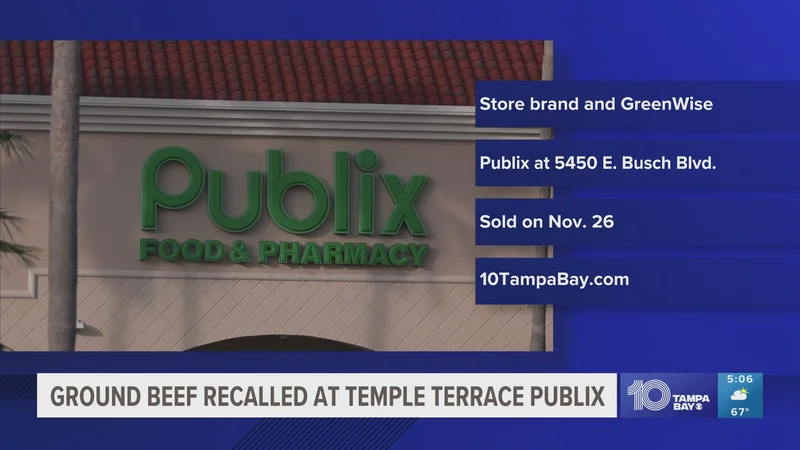Your Fridge Is a Roulette Wheel, and the House Always Wins
Let's play a little game. Go open your freezer. See that box of frozen shrimp scampi you bought for a "quick and easy" dinner? How about that bag of chicken corn dogs for the kids? Feels safe, right? Sealed, frozen, stamped with a "Best By" date from a brand you recognize. It’s a testament to modern convenience.
Except it’s not. It’s a gamble. And lately, the odds have been getting worse.
This isn’t some hypothetical scaremongering. This is the reality of the American grocery store in 2025. Right now, there’s a listeria outbreak tied to prepared pasta that has killed four people—one of whom was a fetus—and sickened at least 20 others across 15 states. Four deaths. From pasta. Let that sink in.
In response, the recall notices are flying, as news breaks that Publix and Walmart sell the newest recalled food in the deadly listeria outbreak. Nate’s Fine Foods is pulling its Scott & Jon’s Shrimp Scampi with Linguini from the shelves of Walmart and Publix in a staggering 42 states. Why? Because the linguini they used might be tainted with the same deadly bacteria. Kroger is yanking its Basil Pesto Bowtie and Smoked Mozzarella Penne salads for the same reason.
These aren't boutique shops in Brooklyn. This is Walmart. This is Kroger. This is Publix. This is where America shops. And it seems they’re all selling tickets to the same food poisoning lottery.
A Symphony of Failure
You have to admire the sheer variety of ways these companies are failing to keep us safe. It's almost artistic in its scope. One week it's Listeria monocytogenes in your pasta, a bacteria that can be particularly deadly for the elderly, pregnant women, and anyone with a less-than-perfect immune system. The next, it’s something a little more… rustic.
Foster Poultry Farms, for instance, had to recall 3.8 million pounds of chicken corn dogs because they were contaminated with, and I am not making this up, pieces of wood. Five people were reportedly injured by splinters in their food. How does wood even get into a corn dog? Seriously, I want someone to draw me a diagram. At what stage in the hyper-processed journey from chicken-ish paste to frozen snack-on-a-stick does a tree get involved?
This is just incompetence. No, 'incompetence' is too clean a word—it's a systemic rot that treats public health as a rounding error on a balance sheet.

The modern food supply chain is like an impossibly complex Jenga tower built on a fault line. A single contaminated batch of linguini from one supplier in California can poison freezer aisles from Miami to Seattle. A slip-up at a single processing plant can embed wood chips in millions of corn dogs. And we, the schmucks at the bottom, are just supposed to trust that every single block in that tower is perfectly placed.
And when it inevitably comes crashing down, what do we get? A sterile, soulless corporate statement. "Walmart and Sam's Club are committed to ensuring the health and safety of customers," the retail giant chirps. Publix’s communications director adds, "As part of our commitment to food safety, potentially impacted product has been removed from the store shelves."
Let me translate that for you: "Our lawyers have informed us that this is the absolute minimum we must say to avoid a class-action lawsuit. Please accept this full refund for the product that might have killed you. Now, don't forget to pick up some of our other fine products on your way out." They expect us to believe this nonsense, and honestly...
It's Not Just the Food
If you think you can just avoid the freezer aisle and be safe, you haven’t been paying attention. The problem isn’t a bad batch of shrimp; the problem is the entire business model of these retail behemoths. Their goal is to move the largest volume of products at the cheapest possible price, and quality control is often the first corner to get cut.
Just look at the other recalls plaguing Walmart. They’re not just selling potentially tainted food. They also sold 610 Gunaito 10-drawer dressers online that were so unstable they failed to meet federal safety standards. The CPSC warned they pose a "risk of serious injury or death to children due to tip-over and entrapment hazards." Offcourse, they were cheap—only $70. And now we know why.
And Publix? Don't get me started. In just the last year, they’ve had recalls for lead in their GreenWise baby food, norovirus-linked oysters from Louisiana, and, according to a Publix Food Recall Update as ‘Foreign Material’ Found in Multiple Products, multiple instances of contamination in their ground beef. It’s a buffet of contamination.
I can just picture someone standing in their kitchen, holding that box of recalled baby food. The cheerful green packaging, the promise of organic purity. They’re squinting at the tiny GTIN code, their heart pounding, wondering if they just fed their infant a spoonful of lead-laced pear puree. The corporate response is to offer a refund. But how do you refund a parent's peace of mind? What’s the sticker price on that?
Then again, maybe I'm the crazy one here. We're the ones demanding ground beef for $4 a pound and dressers that cost less than a tank of gas. We've built this temple of convenience and low prices, and now we're shocked that the foundation is crumbling.
The Recall Notice Is the New Receipt
So what's the takeaway here? The corporate statements are useless. The regulatory agencies are perpetually playing catch-up. The simple truth is that you’re on your own. Every time you push that squeaky-wheeled cart under the fluorescent lights, you're rolling the dice. The best you can do is check the recall lists as obsessively as you check your social media feed and hope you get lucky. Because it's painfully clear nobody else is looking out for you. Good luck with dinner tonight.
